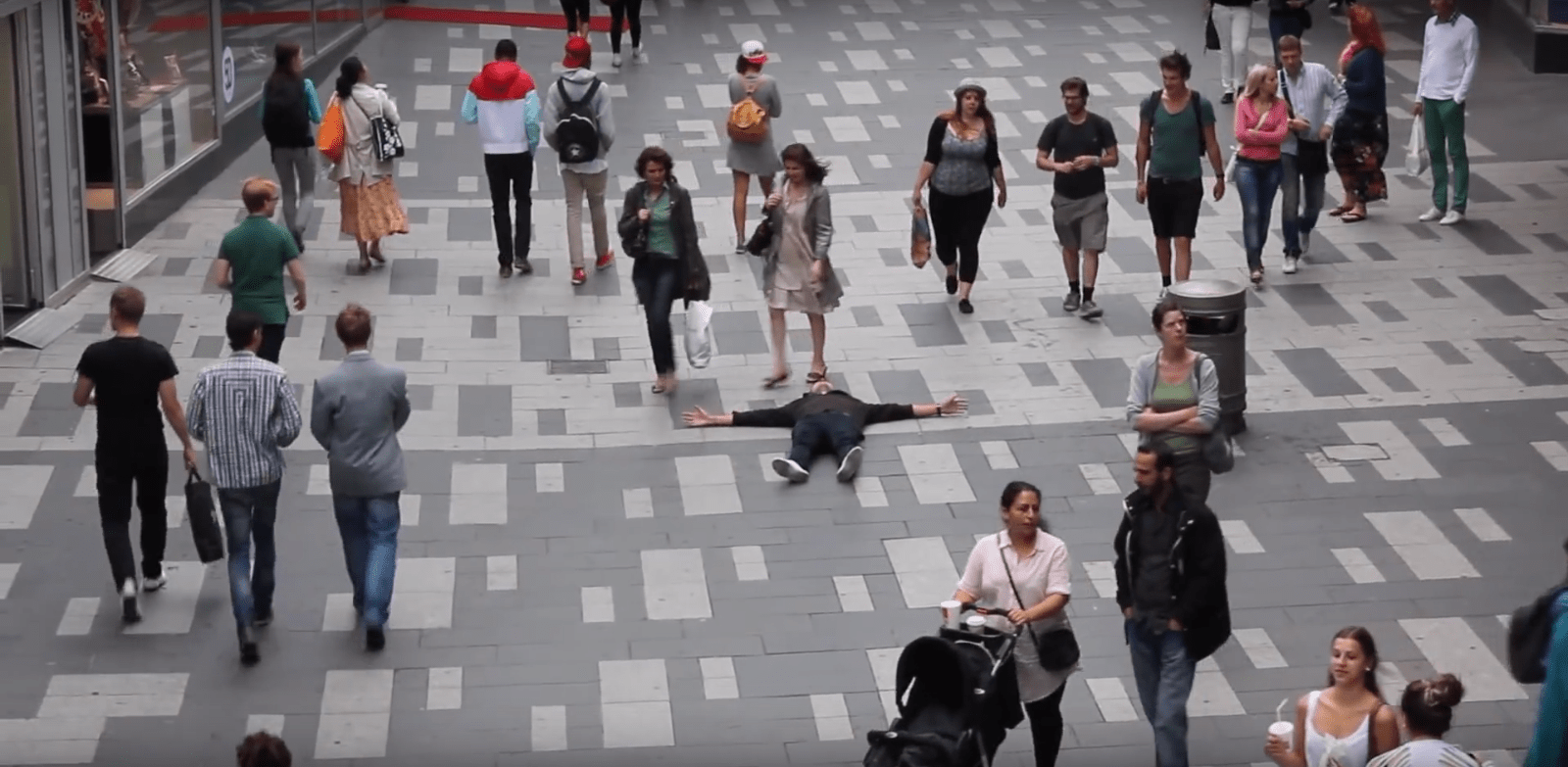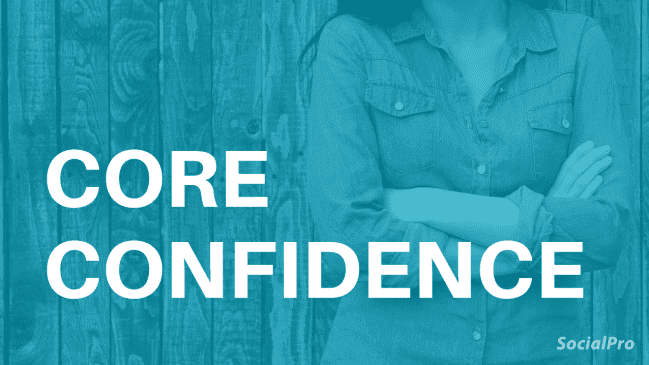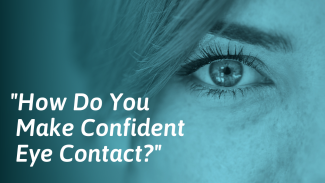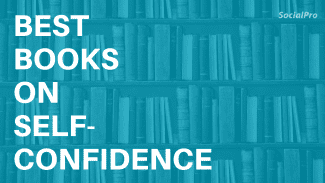This is my guide for how to be confident from within. Meaning, not just being confident in a certain area of life, but core confidence – a belief in yourself, always there, no matter what.
Let’s get to it!
1. Get core confidence by changing how you see your flaws and nervosity
Ever tried pushing away a bad feeling or thought just for it to come back stronger than ever?
What you resist will persist – Carl Jung
Let’s say that you have a voice inside of your head telling you that you’re worthless. The intuitive response is to try to silence or fight the thought.
In reality, this makes the thought stronger.
That’s a quirk in human psychology: When we try to fight feelings and thoughts, they grow stronger.
Behavioral scientists and therapists know this. They teach their clients a whole different way to deal with these thoughts: By turning them into our friends and accepting them.
“Oh, here’s the thought that I’m worthless again. I’m going to let it fly around for a while until it dissolves by itself”.
This is the moment where we develop core confidence: Instead of running from bad thoughts and feelings, we accept them.
But David, are you telling me that I should accept that things are bad and just give up!?
Thanks for asking! Accepting is not giving up. In fact, it’s the opposite: Only when we truly accept our situation can we see it for what it is.
When I accept that I’m afraid to go to a party can I see the situation for what it is, and decide to act anyway. (If I didn’t accept that I was scared, my mind would make up an excuse like “The party seems lame”.)
(This is the core of ACT, Acceptance and Commitment Therapy. It’s one of the most widely used therapy methods in the world).
First, you accept your situation, your thoughts, and your feelings. Then, you commit to doing changes for the better.
2. Rather than affirmations, use what scientists call self-compassion to get core confidence
Did you know that affirmations (Like, telling yourself that you’re valuable 10 times each morning, etc) can actually make you LESS confident? It can make your mind go “No I’m not” so you feel LESS valuable than when you started.
Instead, what if you were to say “I feel worthless now, and that’s OK! It’s human to feel worthless at times.” Wouldn’t that be liberating and take much less energy?
This is called self-compassion. I disliked this for a long time because the word self-compassion sounds so flower power-y. But in reality, it’s the most powerful way to build a core-confidence and people with naturally high self-esteem use it all the time.
Here it is in its essence:
Rather than trying to be great all the time, accept that you’re not always great. And that’s OK!
Here’s another way to word it:
“Be sympathetic toward yourself and for the fact that you’re only human. Treat yourself like you would treat a friend you like a lot”
The next time you talk down on yourself or feel bad about something, try instead talking to yourself like you would talk to a friend you like.
3. Use the SOAL-method to find your core confidence in everyday life
So, now I’ve talked about how to accept feelings rather than pushing them away.
But how do you do this on a day-to-day basis?
Here’s an exercise I do whenever I have a bad feeling. It’s called SOAL. (A behavioral scientist taught me this.)
- Stop what you’re doing and stop your thought loops.
- Observe how it feels in your body. If you feel anxious, where are you anxious? I, for example often feel a moving pressure in my lower chest. Don’t try to stop or change how it feels.
- Accept that this is the feeling you have.
- Let go of the feeling.
(This should take 1-2 minutes).
What now happens can feel almost magic. After a while, it’s like your body goes “Ok, I’ve signaled and David has finally heard me, so I don’t need to signal anymore!” and the feeling or thought weakens!
Whenever you feel nervous or anxious or have any feeling that stresses you out, remember SOAL. Stop – Observe – Accept – Let go
4. How truly confident people deal with nervosity
People with core confidence still feel nervous. It’s just that they see nervosity in a different way than others do.
I used to see nervosity as a sign that something bad was about to happen. I was like “uh oh! I have that nervosity pressure in my chest. This is BAD! Stop! Avoid!”.
As you develop core confidence, you’ll learn that the feeling is just…. A feeling – no more than feeling tired in your legs after taking the stairs.
The next time you feel nervous, practice seeing it as a feeling without adding a negative emotion to it.
Instead of thinking “Oh no, this is bad, I’m nervous”, you can think “I’m feeling nervous because I’m about to do something I’m not used to.”
When I stopped seeing nervosity as something bad, I could feel confident being nervous.
Remember this the next time you feel nervous:
Nervosity is just a bodily sensation like feeling tired or thirsty. It doesn’t mean that you should stop whatever you want to do.
5. How to increase your self-esteem
Self-esteem is how we value ourselves. If we feel that we aren’t worth much, we have low self-esteem.
I’ve read the science behind how to get more self-esteem, and there are bad news and really good news.
The bad news: There are no good exercises you can do to boost your self-esteem. Affirmations, as I talked about before, can even lower your self-esteem. Out of your comfort zone-exercises just give a temporary boost.
The really good news: You CAN skyrocket your self-esteem by doing changes in your life. Research shows that by setting up goals and achieving those goals increases our self-esteem.
Why? Because they make us feel capable. When we feel capable, we feel worthy.
I, for example, had a goal to move to NYC one day. Now that I’m here, I feel a sense of accomplishment. I feel capable. That has increased my self-esteem.
What’s something you can learn and be really good at?
To start increasing your self-esteem, set up a goal and work toward achieving that goal.
6. Borrow the mindset of a confident person (How would a confident person react?)
When I did something embarrassing, I used to bash myself for weeks and months over it. A very socially savvy friend taught me a new mindset: How would a truly confident person react if they did what I just did?
Most often, I come to the conclusion that they wouldn’t care. If a confident person doesn’t care, why should I care? Asking myself what a confident person would do has over time helped me internalize core confidence.
Core confidence isn’t about never messing up. It’s about being OK with messing up.
7. There exists a specific type of meditation that will build your core confidence
I’ve never been much for meditation. I thought it was for hippies. Then, a couple of years ago, I got problems with stress and I had to learn ways to cope with that.
I started doing a body scan meditation, which is basically that you focus on what your body feels like from your toes and all the way up to the top of your head and then back. You start by focusing only on feeling your toes, then feet, then move up slowly and feel your ankles, then your calves, and so on.
You just pay attention to how it feels without evaluating it or labeling it or having thoughts about it.
After a while, you’ve reached your chest and you probably feel anxiety and all kinds of things, but you just slowly continue past it until you’ve reached the top of your head. Then you go back again.
Over time, something happens.
You start accepting whatever you feel in your body without reacting to it. This creates a calm that’s hard to describe, but you can imagine that after you’ve done this scan a couple of hundreds of times, you’ve learned that all these sensations in your body are just an ongoing process – you don’t need to worry about it!
Doing this body scan meditation has helped me develop core confidence.
Here’s a good guide to body scan meditation.
8. Why out of your comfort zone-stunts won’t build core confidence & what to do instead
I have a friend, Nils, who started off as a rather self-conscious and shy person (like most of us do). He managed to evolve through the “loud, compensating self-confidence” to finally arrive at the grounded, authentic, core confidence.
I know that people who get to know him today are certain that he’s born with his confidence.
During one period in his life, Nils tried pushing as far out of his comfort zone as he possibly could

Like laying down on a busy street
 Speaking in front of a large crowd
Speaking in front of a large crowd
 Doing stand-up on the subway
Doing stand-up on the subway
 Talking to girls he felt attracted to.
Talking to girls he felt attracted to.
It’s worth noting that he didn’t pull off all of these things because he felt confident. He did it because he didn’t want to feel nervous.
Here’s what most people will never know about extreme out-of-your-comfort-zone stunts you see on Youtube: They aren’t very effective at building permanent confidence.
Just after Nils had succeeded with a stunt, he obviously felt like he was on the top of the world. But after a few hours, the feeling had worn off. A few days after, he felt like he was back to square one.
He told me that during these years in his life, he didn’t feel secure in his confidence. It bothered him that he still had created this personality of being the one who could do anything but still felt nervous.
When you work hard towards eradicating nervousness, you might have some success. But then the following happens:
First, life throws you a situation where you WILL get nervous despite all your work to eradicate nervousness. As you’ve worked so hard to eradicate it, you feel like you’ve failed: “All this work to become truly confident and here I am still getting nervous”.
Obviously, you don’t want to end up in situations where you feel like a failure. So, your brain solves this by subconsciously avoiding situations that will make you feel nervous.
This is a truly ironic side effect of trying to live a confident life.
Nils made two huge realizations:
- Acknowledging your weaknesses to yourself takes MORE strength than ignoring them
- Acknowledging your weaknesses to others takes EVEN MORE strength than hiding them
So he decided to strive towards being open and acknowledge whatever he felt. He told me how people truly started to respect him when he stopped trying to hide his weaknesses. They respected him because they saw that he was authentic.
Because we are human, we are afraid at times. We can and should strive towards improving ourselves, but despite this, there will always be times in life when we are afraid.
Superficial confidence is about trying to not come off as afraid. TRUE confidence is to be comfortable with being afraid.
In order for Nils to truly accept who he was in any given situation, he first had to acknowledge and accept whatever feelings or thoughts that situation provoked in him.
It makes sense when you think about it:
Because Nils accepts whatever feelings or thoughts any given situation provokes in him, he can truly accept who he becomes. That gives him core confidence about himself that few people have. It’s the confidence of knowing that even if I become afraid, that’s OK. Even if I let others know that I’m afraid, that’s OK too.
When we stop being afraid of being afraid, core confidence starts replacing that fear.
I’m excited to hear your thoughts about this in the comments!







Reading what u wrote made me feel so much love!
Thank you so much 🙂
does make sense face your fears and do it anyway sinceley
This one of the most important (and ironic) things that made me more confident.
I read the advise to “fake it until you make it”. When I however tried to hide my nervousness or even pretended I was feeling just fine I got even more nervous which made it even harder to hide it. I used to do this all the time because I felt people would judge me if they knew I had no confidence. I also thought everyone else was always comfortable in social situations and it was just me who lacked something important.
Interestingly the opposite happened when I accepted that I was afraid of doing something but that I was going to do it anyway. I was still anxious but it didn’t get worse and I didn’t feel like a fraud for trying to hide just how anxious I was.
I eventually even started downright telling people just how nervous I was in certain situations. I’ve never had a bad reaction to that – even when I talked to girls I was attracted to. I actually only had positive reactions.
I remember how I had trouble talking to a girl (who I ended up dating for almost two years) at a get together – we made awkward small talk and there was no bond between us. Then I just admitted that I was freaking out internally right now (which I absolutely was) because I thought she was incredibly attractive (which was also true ;)). For some reason that changed the whole atmosphere – she told me how sweet that was and a few minutes later I was totally relaxed and could be myself.
Thanks for sharing this fascinating story, Sven! Sounds like your approach to confidence is spot on, and glad that it helped you with that girl.
David